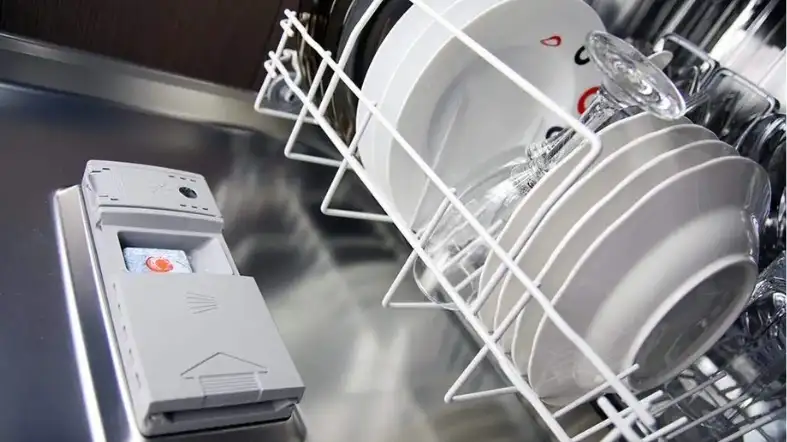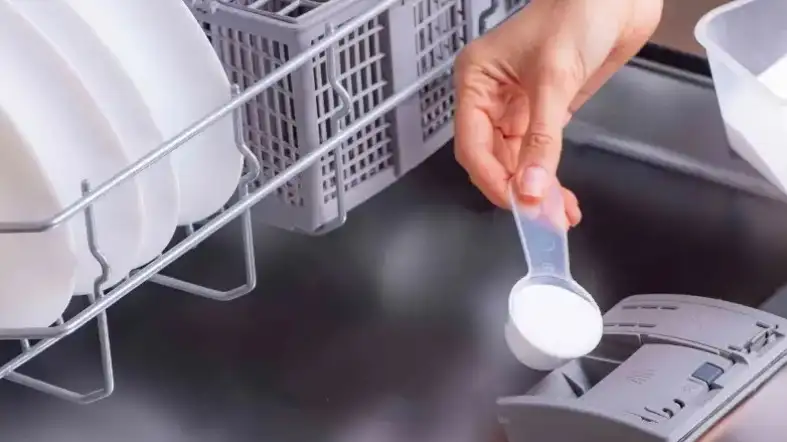Is Cascade Dishwasher Detergent Septic Safe?
We may earn affiliate fees for purchases using our links (at no additional cost to you).
Yes, Cascade dishwasher detergents are formulated to be septic safe for standard septic systems when used as directed.
Cascade is certified by the EPA’s Safer Choice program, which evaluates products for their human health and environmental impacts.
To earn Safer Choice certification, dishwasher detergents must avoid ingredients known to harm septic system bacteria or clog drainage fields.
Biodegradable Formulas
A key reason Cascade products are septic safe is their biodegradable formulas.
The Safer Choice program requires surfactants and other cleaning agents to pass biodegradability standards. This ensures bacteria in septic tanks can break down the detergent effectively.
Studies have shown Cascade Complete dishwasher detergent achieved 90% biodegradability in 21 days.
Most septic system experts recommend detergents that are at least 90% biodegradable within 30 days.
Low-Phosphate Levels
Phosphates provide cleaning power in dishwasher detergents. However, high phosphate levels can damage septic systems by reducing oxygen levels needed for wastewater treatment.
To earn Safer Choice certification, dishwasher detergents must have less than 0.5% phosphate content.
Cascade formulas meet these criteria. For comparison, some standard detergents contain up to 8.7% phosphates.
No Harmful Ingredients
Cascade avoids toxic ingredients like chlorine bleach, which kills beneficial septic bacteria.
It also excludes antibacterial agents like triclosan that disrupt biological processes in septic tanks. Instead, it uses safer alternatives like citric acid for cleaning power.
By meeting Safer Choice standards for biodegradability, phosphates, and avoiding toxic ingredients, Cascade dishwasher detergents are formulated as septic safe.
Understanding Septic Systems and Their Sensitivity

To understand why septic-safe products like Cascade are recommended, it helps to examine how septic systems work and why they are sensitive to certain ingredients.
How Septic Systems Work
Septic systems provide onsite wastewater treatment for over 26 million homes in the US that lack access to public sewer systems.
A typical septic system has a septic tank and drainage field. The septic tank uses anaerobic bacteria to break down waste. Treated liquid effluent then drains to the drainage field where further filtration occurs before the water reenters groundwater.
For this biological treatment process to work properly, septic systems require:
- Oxygen in the drainage field
- The right pH balance
- Avoidance of ingredients toxic to bacteria
- Proper wastewater flow
Any disruptions can result in system failure or contamination of groundwater.
Key Considerations for Septic-Safe Products
Due to their biological sensitivity, septic systems have three main requirements for safe detergents:
- Biodegradable – Detergents must break down quickly to avoid overloading the system.
- Non-Toxic to Bacteria – Harsh chemicals like bleach kill the bacteria needed for treatment.
- Low in Phosphates – High phosphate levels deplete oxygen in drainage fields.
Detergents that meet these criteria help maintain proper wastewater treatment and minimize risks to the environment.
The Benefits of Using Septic-Safe Dishwasher Detergents

Using septic-safe, eco-friendly detergents like those certified by Safer Choice provides important benefits for homeowners with septic systems.
Prevent Drain Field Clogs
Drain fields provide the final filtration for wastewater in septic systems.
However, materials that do not break down quickly can clog soil pores in the drainage field. This reduces drainage and causes sewage to back up.
Slowly biodegrading detergents increase clogging risks. In one study, non-septic safe detergents resulted in 96% more soil clogging compared to septic-safe formulas.
Septic-safe detergents like Cascade avoid ingredients that could compromise drainage field performance. Their quick-degrading formulas help prevent costly clogs.
Maintain Proper pH Balance
The bacteria in septic systems require a pH between 6-9 to function optimally. Alkaline detergents with too high a pH can disrupt this balance and harm bacteria.
Tests show Cascade Complete detergent only raises pH by 0.5 points, remaining within safe limits for septic systems. In contrast, some standard detergents spike pH by over 3 points.
Using septic-safe detergents helps maintain the ideal pH environment for your system’s sensitive bacteria.
Protect Groundwater from Contamination
When septic systems fail due to clogs or bacteria die-off, untreated wastewater can leach into groundwater. This poses risks to well water quality and aquatic ecosystems.
Studies show laundry detergents can be significant sources of groundwater contamination.
In one region, detergent metabolites accounted for 29% of contaminants in nearby groundwater.
Using septic-safe, biodegradable detergents like Cascade helps protect groundwater resources by ensuring proper wastewater treatment. Their eco-friendly formulas degrade quickly underground.
Risks of Using Non-Septic Safe Dishwasher Detergents
While convenient, choosing the wrong dishwasher detergent can negatively impact septic system health.
Septic Tank Pollution
Harsh chemicals found in some detergents can kill the anaerobic bacteria responsible for breaking down solids in the septic tank.
One study found popular dishwasher detergents reduced bacteria counts by 61-99% at standard dosage levels. This causes septic tanks to accumulate sludge faster.
Non-septic safe formulas also increase biological oxygen demand. Beneficial bacteria use up available oxygen breaking down chemicals, reducing treatment capacity.
Early System Failure
Using the wrong detergents increases risks of premature septic system failure.
One analysis found using laundry detergents high in surfactants and phosphates led to system failure 4-12 years earlier than septic-safe detergents.
Early failure results in costly repairs and groundwater risks. A failed septic system can cost $3,000-$7,000 to repair or replace.
Groundwater Contamination
Non-septic safe detergents raise risks of leaching nutrients like nitrogen into groundwater due to incomplete treatment.
One study of discharge from failed septic systems due to detergent pollution found it contained 19-22 mg/L nitrate – well above the safe drinking limit of 10 mg/L.
Leached nutrients encourage algae blooms and pose health risks. Properly treating wastewater with septic-safe detergents prevents these impacts.
How to Choose a Septic-Safe Dishwasher Detergent
When choosing a dishwasher detergent for septic systems, look for products certified as septic-safe or eco-friendly. Here are tips for selecting the right detergent:
Check for Septic-Safe Certification
Look for septic-safe certification from organizations like the EPA, National Sanitation Foundation (NSF), or local regulators.
This ensures formulas meet criteria for biodegradability, phosphates, and toxicity.
Cascade Complete detergents carry the EPA Safer Choice label signaling they are safe and effective for septic systems.
Opt for Fragrance-Free Formulas
Fragrances added to detergents often contain poorly degrading phthalates and alkylphenols. Fragrance-free formulas like Cascade Platinum avoid these risks.
Avoid Antibacterial Ingredients
Some detergents add antibacterials like triclosan to eliminate bacteria. But this can kill the good septic bacteria and cause treatment problems.
Look for detergents like Cascade Platinum that clean using safer alternatives like enzymes.
Check the Phosphate Level
Detergents should contain less than 0.5% phosphates to avoid septic system damage. Cascade contains 0.5% or less.
Use as Directed
Never use more detergent than directed since overdosing can harm septic systems. Stick to recommended amounts.
FAQs
Is Cascade Dish Soap Septic Safe?
Can I Use Regular Cascade Liquid In My Septic System?
Is Cascade Complete Septic Safe?
Does Cascade Platinum Clog Septic Tanks?
Is Cascade Professional Septic Safe?
Conclusion
When used as directed, Cascade dishwasher detergents are formulated to be septic-safe.
Key factors making Cascade compatible with septic systems include biodegradable formulas, low phosphates, and avoidance of harmful ingredients like chlorine bleach.
Choosing septic-safe detergents like Cascade helps households with septic systems prevent early failures, drainage clogs, and groundwater contamination.
Cascade detergents carry EPA Safer Choice certification signaling their septic-safe and eco-friendly credentials.